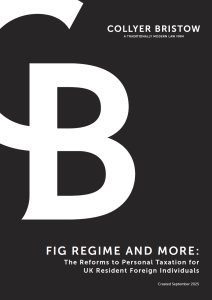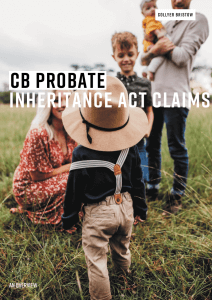
The Team
Our lawyers have the expertise and experience to provide you with creative, personalised solutions in a clear and understandable way.
Our Publications
Discover a wealth of invaluable guidance in the form of guides and brochures written by our expert lawyers.
Our insights
Discover the latest insights and thought leadership from our team of legal experts.
About
Tailored guidance with sensitivity and discretion
Our Trusts and Inheritance Disputes lawyers advise executors, trustees and beneficiaries, in the UK and internationally, on the action to take when a dispute occurs over the administration of a trust or an estate. No client or set of circumstances is the same so we take the time to gain an in-depth understanding of the intricacies of the situation. We can then work with you to develop an individually tailored strategy to help you achieve the best possible outcome.
Wherever possible, we aim to achieve early resolution. However, when litigation is unavoidable, we have the expertise to guide you skillfully through the process. Our team prides itself on producing innovative solutions for clients and has the expertise to resolve high-value, complex disputes involving multiple jurisdictions.
What is contentious probate?
Contentious probate is any legal dispute relating to a person’s estate after their death. It’s an umbrella term that covers a wide range of claims, including:
– Disputes over the validity of a will
– Challenges to the executor’s powers or decision-making
– Applications to remove and replace executors (or other personal representatives)
– Claims for financial provision from an estate by someone who has not been left enough to meet their needs
– Claims to clarify a will when its meaning is unclear
– Claims to rectify an obvious mistake in the will’s content
– Claims to honour a deceased’s promise, where it is not fulfilled in the will
– Disputes about lifetime gifts made by the deceased person
– Claims by or against the estate in respect of debts owed
This is not a complete list. Families are both wealthier and more complex than ever before, meaning the potential for disputes to arise is increasing. Any disagreement about how a loved one’s estate is handled can potentially fall under the contentious probate umbrella.
What is the process for dealing with Trustd & Inheritance Disputes?
There is no single process for dealing with Trustd & Inheritance Disputes. Since each case is different, the process required, and timetable followed, will depend on the nature and facts of the dispute. As a first step, your solicitor will identify whether there is a valid claim, who can bring the claim, and the most effective and proportionate approach for resolving it.
Where possible, we will consider alternative avenues such as mediation to ensure that disputes are resolved quickly and cost-effectively. Some contentious matters, such as claims for rectification and for financial provision under the Inheritance (Provision for Family and Dependants) Act 1975, require an application to the Court within strict deadlines. We will walk you through the process and advise you about the merits and prospects of success, likely costs and timescales so you can make an informed decision about how to proceed.
Who pays Trust & Inheritance Disputes fees?
There may be different answers to this question depending on the claim. The usual rule is that the loser pays the winner’s costs, but there may be exceptions. In some contentious probate claims, costs can be recovered from the estate. In others, a party to the dispute may have to bear their own legal costs. We will explain your options to you clearly and help you decide on the best approach for your situation.
How long do Trusts & Inheritance Disputes take?
Again, this will depend on the type of claim. Some claims have strict time limits; for example, if you are claiming that the deceased should have provided for you but did not, you have just six months from the date of the Grant of Probate to bring the claim. If you are claiming the deceased was coerced into making their will, the time limit can be up to twelve years.
Some claims are much simpler to deal with than others. For example, an application to correct an obvious error in a will, like a typo, is going to be dealt with much quicker than an application to enforce a promise the deceased made before they died. Every claim goes through a number of stages which may or may not include court action. Deciding to settle the claim before it reaches court, or choosing to use a type of Alternative Dispute Resolution such as mediation, will likely shorten the process.
Francis MerrittChartered Legal Executive
+44 20 7470 4529 +44 7947 532112francis.merritt@collyerbristow.com
Spotlight
Challenging a will
Where a will does not accurately reflect the deceased’s wishes, or where there are question marks over how a will was made, we advise clients as to the available options to challenge the will. Circumstances may include an invalidly executed will, fraud or forgery, undue influence, and the testator lacking the requisite testamentary capacity to make a will. We can act in bringing or defending challenges of this type.
Spotlight
Claiming under the Inheritance Act 1975
Certain categories of person can make a claim under the Inheritance (Provision for Family and Dependants) Act 1975 to seek an order for reasonable financial provision from a person’s estate when they have not been left anything under the will. We have experience of acting for both claimants and defendants in these cases.
Spotlight
Disputes with trustees
Beneficiaries sometimes feel that trustees are not complying or fulfilling their duties properly. Such disagreements range from the inadequate provision of information to more fundamental negligence and breach of trust claims. We act for both trustees and beneficiaries in resolving these disputes when they arise.
Services
We support our clients with individually tailored legal advice, in areas such as:
Contesting a Will
If you believe that a will has not been executed properly, or does not reflect your loved one’s true wishes, you may have grounds to contest the will and have it declared invalid. Unnecessary delay in bringing these types of claims can weaken them so it is important that legal advice is sought as soon as possible. Find out more.
Inheritance Act Claims
If a deceased’s will excludes certain people or does not leave them enough to meet their needs, they may be able to make a claim under the Inheritance (Provision for Family and Dependants Act) 1975. A successful claim can result in the distribution of the estate being changed so that (as far as possible) everyone gets the financial support they need.
Find out more.
Equitable Claims to Property
If you have been promised property by a person who died but the promise was not reflected in their will, then you can ask your solicitor to make a claim in proprietary estoppel.
Find out more.
Trust Disputes
Trust disputes can arise for various reasons, such as the mismanagement of trust assets or a disagreement over the interpretation of the trust deed. We have years of experience dealing with trust disputes. We can help if:
- The trust document contains errors or is unclear
- The settlor was unduly influenced or received negligent advice when setting up the trust
- The trust documents do not reflect the settlor’s wishes
- The trustees are not following the terms of the trust
- The trustees are failing in their duty to administer the trust efficiently
- The trustees are not providing information about the trust or its assets
- You believe that someone is using the trust’s funds inappropriately
- The trust is a sham to hide real legal ownership of the assets
We help beneficiaries and trustees
If you are involved in a trust dispute, it is important to get legal advice as soon as possible. We help beneficiaries who wish to challenge how the trust has been set up and administered, and we help trustees who are being challenged by beneficiaries. We can also advise on potential conflicts of interest between the trustees and their powers of appointment and removal, or regarding a trustee’s duties of disclosure.
Our aim is to resolve disputes quickly and amicably, using negotiation where possible. For more information, please contact our expert team.
Trusts and Inheritance Disputes Publications

FIG Regime and more: The Reforms to Personal Taxation for UK Resident Foreign IndividualsWhat the new rules mean for UK resident foreign taxpayers - What the new rules mean for UK resident foreign taxpayers
From 6 April 2025, UK tax for foreign residents is based solely on tax residence, not domicile. The simplified system affects income, capital gains, and inheritance tax, offering some residents up to four years to shelter non-UK income and gains.

Inheritance Act Claims:An overview - An overview
If a deceased’s Will fails to make adequate provision for someone who falls within certain categories, the Inheritance Act 1975 may permit them to successfully claim part of the deceased’s estate. This guide explains more.
Trusts and Inheritance Disputes insights
Shorter Reads
2025 Spring Statement2025 Spring Statement
Read more
Shorter Reads
Why should families take heed of the Alain Delon inheritance dispute?Why should families take heed of the Alain Delon inheritance dispute?
Read more
Longer Reads
Can I prove my sister’s financial abuse?Can I prove my sister’s financial abuse?
Read more
Longer Reads
How English courts deal with gender discrimination in inheritance disputesHow English courts deal with gender discrimination in inheritance disputes
Read more
Shorter Reads
A promise of inheritance has been withdrawn. Can I claim against my parents?A promise of inheritance has been withdrawn. Can I claim against my parents?
Read more
Longer Reads
Disputes over the proper administration of trusts and estatesDisputes over the proper administration of trusts and estates
Read more
News
New Partner hire for Collyer Bristow’s Tax and Estate Planning teamNew Partner hire for Collyer Bristow’s Tax and Estate Planning team
Read more
Shorter Reads
Can my half-sister challenge our father’s will?Can my half-sister challenge our father’s will?
Read more
You might also like
Need some more information? Make an enquiry below
Trusts and Inheritance Disputes key contacts
- Samara
DuttonPartner
Talk to Samara about Trusts & Inheritance disputes and Private wealth
Trusts and Inheritance Disputes
Trusts and Inheritance Disputes
With an ageing and increasingly wealthy population and the rise of more diverse family structures, disputes over trusts and estates have become more prevalent. You may not have received what you had anticipated from an estate, have concerns about how a trust is being managed or be questioning the validity of a will or gift. Pursuing or defending a claim can be distressing for those involved with the potential for acrimony to arise within families. To support you in navigating these challenging situations, you should be working closely with advisers who can provide you with pragmatic guidance with sensitivity and discretion.
The Team
Our lawyers have the expertise and experience to provide you with creative, personalised solutions in a clear and understandable way.
Our Publications
Discover a wealth of invaluable guidance in the form of guides and brochures written by our expert lawyers.
Our insights
Discover the latest insights and thought leadership from our team of legal experts.
TAILORED GUIDANCE WITH SENSITIVITY AND DISCRETION
Our Trusts and Inheritance Disputes lawyers advise executors, trustees and beneficiaries, in the UK and internationally, on the action to take when a dispute occurs over the administration of a trust or an estate. No client or set of circumstances is the same so we take the time to gain an in-depth understanding of the intricacies of the situation. We can then work with you to develop an individually tailored strategy to help you achieve the best possible outcome.
Wherever possible, we aim to achieve early resolution. However, when litigation is unavoidable, we have the expertise to guide you skillfully through the process. Our team prides itself on producing innovative solutions for clients and has the expertise to resolve high-value, complex disputes involving multiple jurisdictions.
What is contentious probate?
Contentious probate is any legal dispute relating to a person’s estate after their death. It’s an umbrella term that covers a wide range of claims, including:
– Disputes over the validity of a will
– Challenges to the executor’s powers or decision-making
– Applications to remove and replace executors (or other personal representatives)
– Claims for financial provision from an estate by someone who has not been left enough to meet their needs
– Claims to clarify a will when its meaning is unclear
– Claims to rectify an obvious mistake in the will’s content
– Claims to honour a deceased’s promise, where it is not fulfilled in the will
– Disputes about lifetime gifts made by the deceased person
– Claims by or against the estate in respect of debts owed
This is not a complete list. Families are both wealthier and more complex than ever before, meaning the potential for disputes to arise is increasing. Any disagreement about how a loved one’s estate is handled can potentially fall under the contentious probate umbrella.
What is the process for dealing with Trustd & Inheritance Disputes?
There is no single process for dealing with Trustd & Inheritance Disputes. Since each case is different, the process required, and timetable followed, will depend on the nature and facts of the dispute. As a first step, your solicitor will identify whether there is a valid claim, who can bring the claim, and the most effective and proportionate approach for resolving it.
Where possible, we will consider alternative avenues such as mediation to ensure that disputes are resolved quickly and cost-effectively. Some contentious matters, such as claims for rectification and for financial provision under the Inheritance (Provision for Family and Dependants) Act 1975, require an application to the Court within strict deadlines. We will walk you through the process and advise you about the merits and prospects of success, likely costs and timescales so you can make an informed decision about how to proceed.
Who pays Trust & Inheritance Disputes fees?
There may be different answers to this question depending on the claim. The usual rule is that the loser pays the winner’s costs, but there may be exceptions. In some contentious probate claims, costs can be recovered from the estate. In others, a party to the dispute may have to bear their own legal costs. We will explain your options to you clearly and help you decide on the best approach for your situation.
How long do Trusts & Inheritance Disputes take?
Again, this will depend on the type of claim. Some claims have strict time limits; for example, if you are claiming that the deceased should have provided for you but did not, you have just six months from the date of the Grant of Probate to bring the claim. If you are claiming the deceased was coerced into making their will, the time limit can be up to twelve years.
Some claims are much simpler to deal with than others. For example, an application to correct an obvious error in a will, like a typo, is going to be dealt with much quicker than an application to enforce a promise the deceased made before they died. Every claim goes through a number of stages which may or may not include court action. Deciding to settle the claim before it reaches court, or choosing to use a type of Alternative Dispute Resolution such as mediation, will likely shorten the process.
Samara DuttonPartner
View Samara Dutton's profileAbbie ColemanAssociate
View Abbie Coleman's profileCarly RussellPartner
View Carly Russell's profileFrancis MerrittChartered Legal Executive
View Francis Merritt's profileJames AustenPartner
View James Austen's profilePeter PrattSenior Associate
View Peter Pratt's profileSPOTLIGHT
Challenging a willopen
Where a will does not accurately reflect the deceased’s wishes, or where there are question marks over how a will was made, we advise clients as to the available options to challenge the will. Circumstances may include an invalidly executed will, fraud or forgery, undue influence, and the testator lacking the requisite testamentary capacity to make a will. We can act in bringing or defending challenges of this type.
Claiming under the Inheritance Act 1975open
Certain categories of person can make a claim under the Inheritance (Provision for Family and Dependants) Act 1975 to seek an order for reasonable financial provision from a person’s estate when they have not been left anything under the will. We have experience of acting for both claimants and defendants in these cases.
Disputes with trusteesopen
Beneficiaries sometimes feel that trustees are not complying or fulfilling their duties properly. Such disagreements range from the inadequate provision of information to more fundamental negligence and breach of trust claims. We act for both trustees and beneficiaries in resolving these disputes when they arise.
Contesting a Will
If you believe that a will has not been executed properly, or does not reflect your loved one’s true wishes, you may have grounds to contest the will and have it declared invalid. Unnecessary delay in bringing these types of claims can weaken them so it is important that legal advice is sought as soon as possible. Find out more.
Inheritance Act Claims
If a deceased’s will excludes certain people or does not leave them enough to meet their needs, they may be able to make a claim under the Inheritance (Provision for Family and Dependants Act) 1975. A successful claim can result in the distribution of the estate being changed so that (as far as possible) everyone gets the financial support they need.
Find out more.
Equitable Claims to Property
If you have been promised property by a person who died but the promise was not reflected in their will, then you can ask your solicitor to make a claim in proprietary estoppel.
Find out more.
Trust Disputes
Trust disputes can arise for various reasons, such as the mismanagement of trust assets or a disagreement over the interpretation of the trust deed. We have years of experience dealing with trust disputes. We can help if:
- The trust document contains errors or is unclear
- The settlor was unduly influenced or received negligent advice when setting up the trust
- The trust documents do not reflect the settlor’s wishes
- The trustees are not following the terms of the trust
- The trustees are failing in their duty to administer the trust efficiently
- The trustees are not providing information about the trust or its assets
- You believe that someone is using the trust’s funds inappropriately
- The trust is a sham to hide real legal ownership of the assets
We help beneficiaries and trustees
If you are involved in a trust dispute, it is important to get legal advice as soon as possible. We help beneficiaries who wish to challenge how the trust has been set up and administered, and we help trustees who are being challenged by beneficiaries. We can also advise on potential conflicts of interest between the trustees and their powers of appointment and removal, or regarding a trustee’s duties of disclosure.
Our aim is to resolve disputes quickly and amicably, using negotiation where possible. For more information, please contact our expert team.
Trusts and Inheritance Disputes Publications
Trusts and Inheritance Disputes insights
Shorter Reads
2025 Spring Statement2025 Spring Statement
Read more
Shorter Reads
Why should families take heed of the Alain Delon inheritance dispute?Why should families take heed of the Alain Delon inheritance dispute?
Read more
Longer Reads
Can I prove my sister’s financial abuse?Can I prove my sister’s financial abuse?
Read more
Longer Reads
How English courts deal with gender discrimination in inheritance disputesHow English courts deal with gender discrimination in inheritance disputes
Read more
Shorter Reads
A promise of inheritance has been withdrawn. Can I claim against my parents?A promise of inheritance has been withdrawn. Can I claim against my parents?
Read more
Longer Reads
Disputes over the proper administration of trusts and estatesDisputes over the proper administration of trusts and estates
Read more
News
New Partner hire for Collyer Bristow’s Tax and Estate Planning teamNew Partner hire for Collyer Bristow’s Tax and Estate Planning team
Read more
Shorter Reads
Can my half-sister challenge our father’s will?Can my half-sister challenge our father’s will?
Read more
Need some more information? Make an enquiry below.
Message us on WhatsApp (calling not available)
Please note that Collyer Bristow provides this service during office hours for general information and enquiries only and that no legal or other professional advice will be provided over the WhatsApp platform. Please also note that if you choose to use this platform your personal data is likely to be processed outside the UK and EEA, including in the US. Appropriate legal or other professional opinion should be taken before taking or omitting to take any action in respect of any specific problem. Collyer Bristow LLP accepts no liability for any loss or damage which may arise from reliance on information provided. All information will be deleted immediately upon completion of a conversation.
Close

























